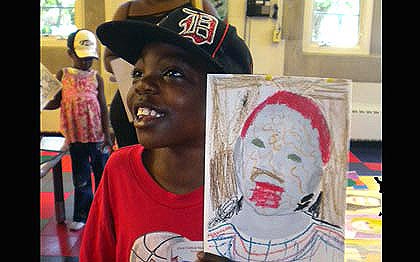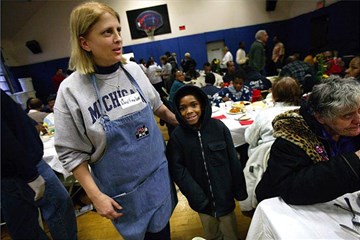"I used to hear 'the poor' and picture some rundown streets in some inner-city areas, far from the small town … where I live," the Rev. Lee Schott wrote in a blog. "'The poor' were nameless, faceless and distant. People for whom we'd leave food at the local food pantry. I was pretty OK with that."
Schott's appointment to Women at the Well United Methodist Church at the Iowa Correctional Institution for Women in Mitchellville changed her perspective of ministry from "to" to "with."
Today "With" is a campaign to raise awareness, educate and inspire people around ministry with the poor, one of the denomination's four areas of focus. The General Board of Church and Society and the General Board of Global Ministries lead the way.
Because of learning opportunities introduced in 2013, nearly 300 United Methodists have participated in five regional "Ministry With*" training events for people interested in transformational, relationship-based ministries with people living in poverty.
"We like to think of ourselves as a mission with a church community rather than a church community with a mission" says the Rev. Brian Combs, founding pastor of the Haywood Street church in Asheville, North Carolina. "People in poverty run, manage and are stewards of all of our ministries."
 |
| A child at Mom's Place shows off his painting created during the after-school art program at Cass Community United Methodsit Church. |
Located in the homeless corridor of Asheville's West Side, Haywood Street defines itself as a transformative open community of Christ, creating opportunities to serve and be served. All who participate are empowered to claim their identity as children of God.
Cass Community United Methodist Church (founded in 1881) is in a changing community, explains the Rev. Faith Fowler, who has served the congregation more than 20 years. First, it was home to Detroit's well-to-do families. Next, it accommodated migrants from the South who moved north for assembly work in the automobile factories. In the 1960s and 1970s, it was associated with widespread use of illegal drugs, crime, prostitution and poverty.
Ministry with the poor, then, has a long history at Cass Community.
"Cass Church established a soup kitchen during the Great Depression by gleaning from what were rural areas and are now Detroit suburbs," Fowler says. "The food program has never been interrupted. Today Cass makes and serves 1 million meals annually."
Over time, other programs were added as unmet needs were identified, including day programs "with and for individuals who had mental illnesses, developmental disabilities, as well as poor seniors and youth." In 2002, a separate but linked nonprofit – Cass Community Social Services –expanded to include residential and employment programs. More than 300 men, women and children experiencing homelessness stay in a Cass facility each night, and 85 formerly unemployed adults have permanent jobs in Cass Community's Green Industries.
At Cass Community, Christ-centered ministries offer balm for the hungry, the sick, the homeless, the unemployed and others in crisis.
Barbara Dunlap-Berg is general church content editor for United Methodist Communications, Nashville, Tennessee.
One of seven apportioned giving opportunities of The United Methodist Church, the World Service Fund is the financial lifeline to a long list of Christian mission and ministry throughout the denomination. Please encourage your leaders and congregations to support the World Service Fund apportionment at 100 percent.





